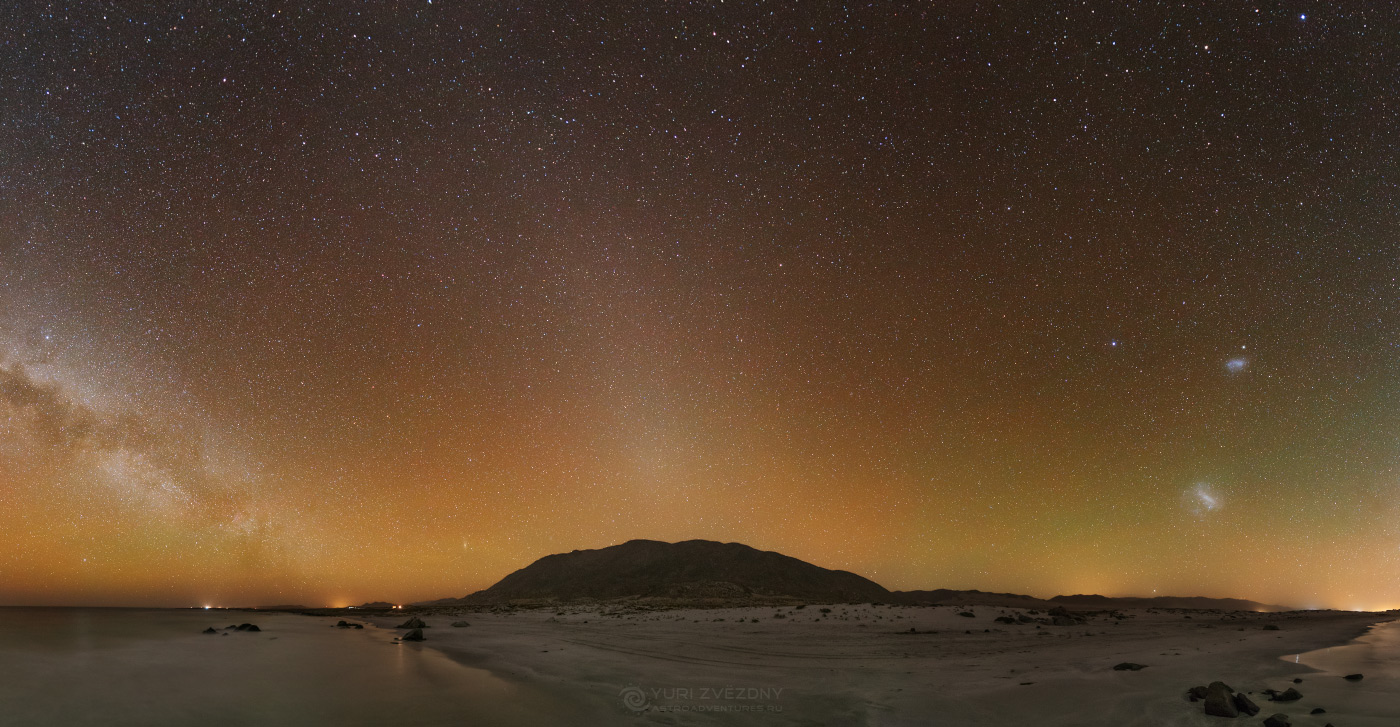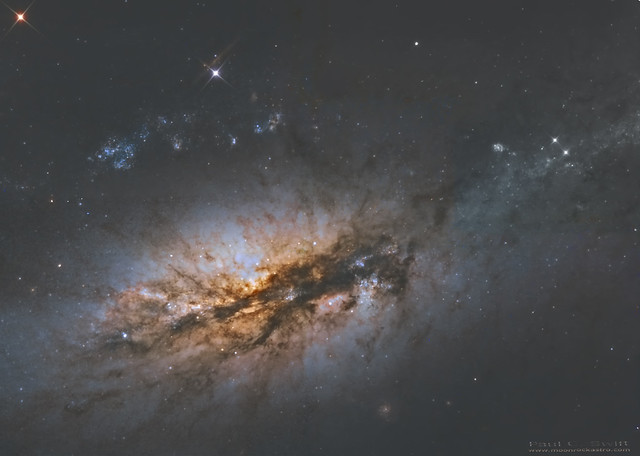Page 5 of 6
Re: Submissions: 2017 March
Posted: Fri Mar 24, 2017 11:29 am
by Stefan Westphal
NGC 772 with integrated flux
Copyright: Stefan Westphal
More Data can you see here:
http://www.astrobin.com/283044/
Re: Submissions: 2017 March
Posted: Fri Mar 24, 2017 6:20 pm
by shtutik
Glacier "White stones"
Argentina, Patagonia
Author's site:
http://www.astroadventures.ru/
Copyright: Yuri Zvezdny
Re: Submissions: 2017 March
Posted: Fri Mar 24, 2017 6:30 pm
by shtutik
Gegenschein over Cerro Negro, Atacama
Author's site:
http://www.astroadventures.ru/
Copyright: Yuri Zvezdny
Re: Submissions: 2017 March
Posted: Sat Mar 25, 2017 2:31 am
by GerminianiMaicon
NGC 3324
Gabriela Mistral Nebula
HaRGB
120 - 8 - 4 - 4 (minutes)
Total: 136 minutos
TS 115/800
ZWO ASI 1600 Mono Cooled
Re: Submissions: 2017 March
Posted: Sat Mar 25, 2017 8:13 am
by ildiora
Trails Of Lights And Fires On Mount Etna 2 - Unesco World Heritage Site
dariogiannobile.com
Copyright: Dario Giannobile
Sicily - March 2017, The Volcano Etna woke for the second time in a month.
According to Greek mythology, Hephaestus was the craftsman and smith of gods.
The ancient Greeks and Sicilians believed that he had his abode and his forge under the volcano Etna and that the eruptions were the proof of his mighty work.
From ct.ingv.it: "On the morning of 15 March 2017, a new eruptive episode started at Etna's Southeast Crater. The eruptive vent was located in the area of the former "saddle" between the southeast Crater (SEC) and the New Southeast Crater (NSEC). In the early morning hours of 15 March, a small lava flow started oozing down the south flank of the SEC-NSEC cone complex. Then the eruptive activity rapidly intensified with nearly constant Strombolian explosions that generated amounts of volcanic ash dispersed in the atmosphere. The lava flow had reached the base of the cone and was slowly expanding on the gently sloping terrain toward south.”
The landscape was enlightened by the gentle light of the Moon showing the “Sciara”, the black volcanic, rocks covered by a thick layer of snow.
From the top crater a fountain of lava left traces on the sky in front of a curtain of gentle lights pictured by the stars rotating around Polaris.
Dario G
Re: Submissions: 2017 March
Posted: Sat Mar 25, 2017 8:24 am
by ildiora
ildiora wrote:Trails Of Lights And Fires On Mount Etna - Unesco World Heritage Site
http://www.dariogiannobile.com
Copyright: Dario Giannobile
...........
After publishing the image I discovered that small earthquakes were recorded in the picture as a consequence of the Strombolian activity!
Here is a detail that shows the volcanic tremor as can be seen in the star trails that appear not regular and smooth!!!
Dario
Hale-Bopp 20 years ago
Posted: Sat Mar 25, 2017 12:37 pm
by Sebastian Voltmer
Copyright: Sebastian Voltmer
http://www.astrofilm.com
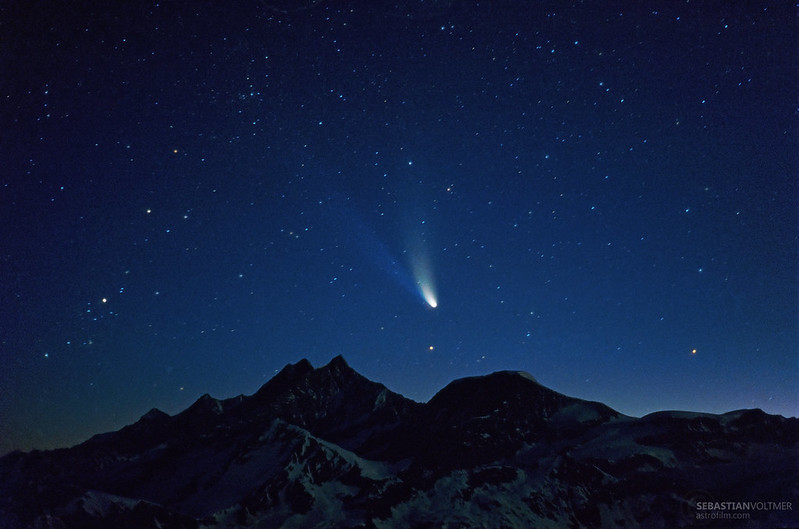
Comet Hale-Bopp on April 4, 1997 above the Dom with an elevation of 4,545 m. The Dom is the highest mountain located entirely on Swiss territory. 15 sec exposure on Kodak EPP 100 (hypersensitized) using a 50 mm f/1.7 lens, taken from Gornergrat (3,150 m), Switzerland.
Enlarge:
https://www.flickr.com/photos/spacemovi ... 969484470/
Large Magellanic Cloud - H-alpha
Posted: Sat Mar 25, 2017 1:18 pm
by Sebastian Voltmer
Copyright: Sebastian Voltmer
http://www.astrofilm.com
https://c2.staticflickr.com/2/1491/2465 ... f9_c_d.jpg
High resolution with captions:
https://c2.staticflickr.com/2/1640/2494 ... e2_b_d.jpg
Ha: 17x300sec, R: 16x180sec, G: 16x180sec, B: 3x180sec
OTA: Takahashi FSQ ED
Focal Length: 530mm (f/5.0)
CCD: FLI Microline 16803
Mount: Paramount PME
Location: Siding Spring Observatory / iTelescope.Net
edit (bystander): Labeled Version -
https://www.flickr.com/photos/spacemovie/24942093651
The Lunar south pole
Posted: Sat Mar 25, 2017 1:37 pm
by Sebastian Voltmer
Copyright: Sebastian Voltmer
http://www.astrofilm.com
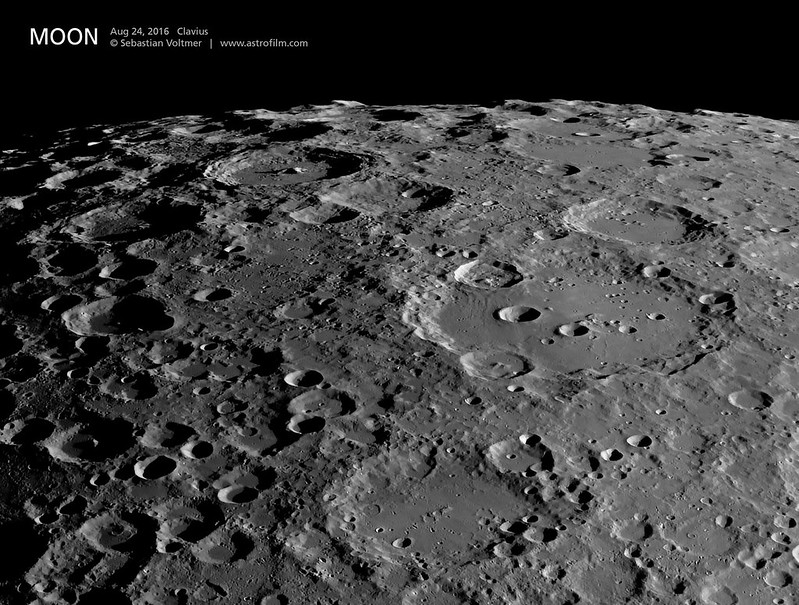
All sizes on Flickr:
https://www.flickr.com/photos/spacemovi ... 258904996/
The Lunar south pole with the Leibniz Mountains, Crater Moretus and Crater Clavius.
Aug 24, 2016
Instrument: C11 EdgeHD
Camera: QHY5LII
Filter: R610nm
Location: Spichren, France
Eruptive Prominence
Posted: Sat Mar 25, 2017 1:41 pm
by Sebastian Voltmer
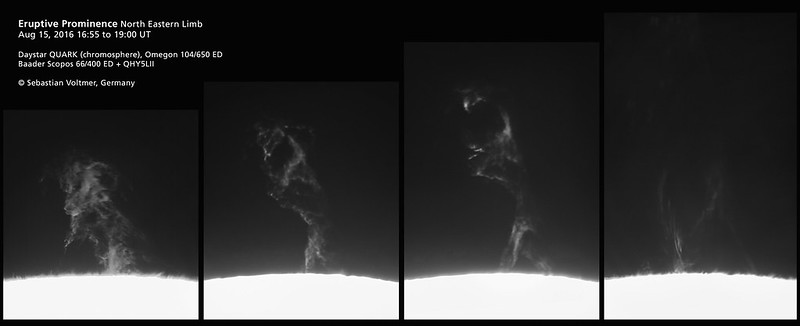
All sizes on Flickr:
https://www.flickr.com/photos/spacemovi ... 258904996/
Eruptive Prominence
North Eastern Limb
Aug 15, 2016 16:55 to 19:00 UT
Daystar QUARK (chromosphere), Omegon 104/650 ED
Baader Scopos 66/400 ED + QHY5LII
© Sebastian Voltmer, Germany
Hale-Bopp as neon tube
Posted: Sat Mar 25, 2017 1:54 pm
by Sebastian Voltmer
Copyright: Sebastian Voltmer
http://www.astrofilm.com
Startrail image of the comet Hale-Bopp from April 3, 1997 passing behind the Weisshorn summit (4,505 m) near Zermatt. 15 min exposure on Kodak EPP 100 using a 50 mm f/1.7 lens @ f/3. Taken from Gornergrat (3,150 m), Switzerland.
Hale-Bopp -> zoom
Posted: Sat Mar 25, 2017 2:41 pm
by Sebastian Voltmer
Copyright: Sebastian Voltmer
http://www.astrofilm.com
First shot:
Hale-Bopp on April 3, 1997. The blue ione tail crosses the double star cluster h & chi im Perseus and reaches the Heart- and Soul Nebula. 20 min exposure on Kodak EPP 100 (hyp.) with a 50mm lens. Taken from Gornergrat (3,150 m), Switzerland.
Second shot:
Coma and streamer of Hale-Bopp. 10 min exposure using a C8 telescope @ 1230 mm f/6.3 on Kodak EPP 100 (hyp.)
Third shot:
The False Nucleus of Hale-Bopp on April 3, 1997. Eyepiece projection through a C8 telescope. Taken from Gornergrat (3,150 m), Switzerland
on vimeo:
https://vimeo.com/209722620
Cheers,
Sebastian
Re: Submissions: 2017 March
Posted: Sat Mar 25, 2017 8:13 pm
by mftoet
Barnard's Loop, M78 & LDN 1622
]www.mauricetoet.nl
Copyright: Maurice Toet
The constellation of Orion is full op splendour. Here we can see a river of ionised hydrogen atoms streaming from the top left to the lower right corner of the image. It is part of Barnard's Loop. In this composition, Barnard's Loop crosses between M78 (in the lower left) and LDN 1622, also know as the "Boogie Man Nebula".
https://photos.smugmug.com/Deep-sky/i-q ... 225-X3.jpg
http://www.mauricetoet.nl/Deep-sky/i-qFS6F3J/A
Re: Submissions: 2017 March
Posted: Sun Mar 26, 2017 12:13 am
by KuriousGeorge
M88. Copyright KG Observatory.
Charles Messier described the 88th entry in his 18th century catalog of Nebulae and Star Clusters as a spiral nebula without stars. Of course the gorgeous M88 is now understood to be a galaxy full of stars, gas, and dust, not unlike our own Milky Way. In fact, M88 is one of the brightest galaxies in the Virgo Galaxy Cluster some 50 million light-years away. The arms are lined with young blue star clusters, pink star-forming regions, and obscuring dust lanes extending from a yellowish core dominated by an older population of stars. Spiral galaxy M88 spans over 100,000 light-years.
Imaging telescope or lens: Celestron 8" EdgeHD
Imaging camera: QSI 660 WSG
Mount: Losmandy G-11
Focal reducer: Celestron 0.7X
Software: PixInsight 1.8, PHD Guiding 2, Neat Image V7, Sequence Generator Pro, Maxim DL6, Adobe Photoshop CC 2014, Astronomy Tools Actions Set V1.6
Filters: Astrodon 1.25" R, Astrodon 1.25" B, Astrodon 1.25" G, Astrodon 1.25" L
Accessories: Innovations Foresight ONAG SC, Optec FocusLock, Starizona MicroTouch Autofocuser
Resolution: 1457x1277
Dates: March 9, 2017, March 15, 2017, March 17, 2017, March 23, 2017
Frames:
Astrodon 1.25" B: 75x120" -20C bin 1x1
Astrodon 1.25" G: 54x120" -20C bin 1x1
Astrodon 1.25" L: 82x120" -20C bin 1x1
Astrodon 1.25" R: 64x120" -20C bin 1x1
Integration: 9.2 hours
Darks: ~20
Flats: ~80
Flat darks: ~80
Bias: ~20
Mean SQM: 19.75
Pixel scale: 0.642 arcsec/pixel
Locations: Home, Rancho Santa Fe, California, United States
Re: Submissions: 2017 March
Posted: Sun Mar 26, 2017 12:15 am
by lumenmikie
Venus at Inferior Conjunction
Well almost: 1 hr 19 min after, due to clouds
Copyright: Michael J. Hayford
Takahashi TOA-150 with Televue 2x barlow working at 3.3x.
Canon 80D video, 3.1x digital zoom
Best 100 frames of 3700. Autostakkert 2, PixInsight
Imaged from Monrovia, California.
Mike
Re: Submissions: 2017 March
Posted: Sun Mar 26, 2017 7:57 am
by mrtvrt
Something fell from the sky Cosmic ray?
22 March 2017 20:35 UTC, Estonia, Harjumaa, Türisalu

Moving gif
http://i.imgur.com/vIwOTSI.gif
Re: Submissions: 2017 March
Posted: Sun Mar 26, 2017 8:43 am
by jaspalchadha
M3 Cluster
Credits: Jaspal Chadha
Flickr link
https://flic.kr/p/T5CNVF
Location: London UK
Re: Submissions: 2017 March
Posted: Sun Mar 26, 2017 11:15 am
by Adrien Mauduit
Moon and Jupiter and its moons
Credits: Adrien Mauduit
Re: Submissions: 2017 March
Posted: Sun Mar 26, 2017 11:17 am
by Adrien Mauduit
Powerfull aurora borealis display in Denmark
Credits: Adrien Mauduit
We have been waiting over 4 months to see a display like that! And the wait is finally over, it's not so easy to be at the bottom of the hill in the sun's cycle. The NOAA promised a G1 storm watch for last night, and we got a good show from 8:00pm til 10:00pm but Lady aurora was hardly visible through the fast moving storm cells and showers!! Then around 11:00pm it snowed for an hour, so I went back home and I thought my night was over. As I look back at the magnetometer before going to bed, it's going crazy again and the rain had let up, clearing up! I hurried back to the point I was shooting at and got in just in time to capture these magnificent green and pink pillars (G2 storm)! The marvelous show lasted only minutes, but it was well worth going back!
Sony a7r2 + Sony 28mm FE f/2.0, 14'', f/2, ISO 3200
Re: Submissions: 2017 March
Posted: Sun Mar 26, 2017 11:24 am
by Adrien Mauduit
Earth, water and Sky
Credits: Adrien Mauduit
Rising milky way core over the still Baltic, reflecting the firmament, with a hint of aurora towards the North.
Ordrupnæs, Denmark. March 24th 2017
Re: Submissions: 2017 March
Posted: Sun Mar 26, 2017 11:33 am
by Adrien Mauduit
Milky way core reflecting onto the still Baltic
Credits: Adrien Mauduit
It is really to get a clean shot of the milky way in Denmark, as the main island is constantly battered by sea mist, salty winds and haze. Two nights ago was the perfect night to get the perfect rare shot at the rising milky way core over the silent and still waters of the Baltic sea, mirroring our galaxy
Re: Submissions: 2017 March
Posted: Mon Mar 27, 2017 5:40 pm
by moonrocks
Re: Submissions: 2017 March
Posted: Mon Mar 27, 2017 10:36 pm
by alexconu
After a very rainy winter in Lofoten, I am heading for one month to my home country, Romania.
Last night, while flying from Bodø to Oslo I was expecting to see some Aurora activity, given the forecast. So, the moment we took off, my eyes got stuck to the window. For about 3/4 of the flight, beautiful Northern Lights danced on both sides of the plane. Big thank you to the crew of SAS flight SK4127 for turning off the cabin lights. Really beautiful show.
Alex Conu
http://www.astrographist.com
Comet Hale-Bopp 20 years ago
Posted: Tue Mar 28, 2017 12:40 am
by Sebastian Voltmer
Copyright: Sebastian Voltmer
http://www.astrofilm.com
Comet Hale-Bopp on April 4, 1997 next to the Weisshorn summit (4,505 m) near Zermatt. 15 sec exposure on Kodak Ektacolor Pro Gold 400 using a 50 mm f/1.7 lens. Taken from Gornergrat (3,130 m), Switzerland.
Flickr link:
https://flic.kr/p/SUS5YY
Re: Submissions: 2017 March
Posted: Tue Mar 28, 2017 3:34 pm
by Adrien Mauduit
Solar storm under the Danish milky way
Credits: Adrien Mauduit
The on-going solar storm was bright and powerful enough to be seen from Denmark, where it put on a magical show before the clouds rolled in on March 27th 2017. The picture is taken on Høve strand in Denmark over the calm shores of the Baltic sea, reflecting the aurorae. The nice arc of the winter milky way (orion, California nebula, Rosette nebula) is disappearing towards the north to give its place to the spring milky way that will appear above the south-eastern horizon hours later.

